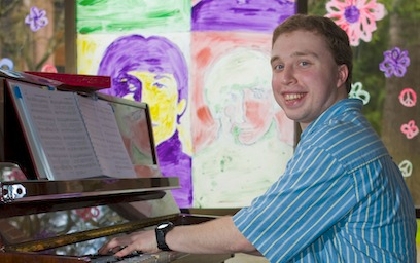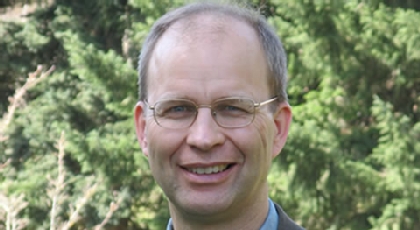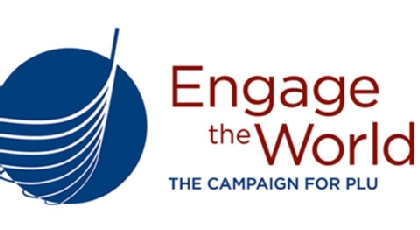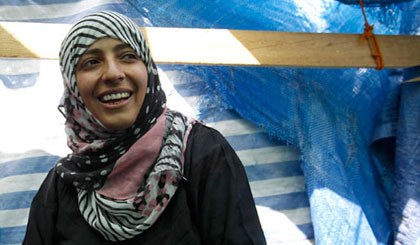Page 298 • (3,688 results in 0.037 seconds)
-

resources, and inspiration will benefit students studying jazz at PLU. Students may even have new opportunities for future guest clinics, perhaps in person or held remotely (virtual clinics were a highlight of our remote learning period)! This conference participation was funded by professional development grants from the School of Arts and Communication and the Department of Music. Vianna expressed his appreciation for these funding sources, saying, “I am very grateful to School of Arts and
-
universities (that are using it),” Ebbinga said. “There are high schools and grade schools using it. “Learning the program can take you into any field. There are endless opportunities,” he said. Read Previous Vote for the first Hebrew Idol Read Next Civil War love letter inspires wind ensemble COMMENTS*Note: All comments are moderated If the comments don't appear for you, you might have ad blocker enabled or are currently browsing in a "private" window. LATEST POSTS Three students share how scholarships
-
argument, that the interest rate should be left alone for now, was developed in concert with economics majors Drew Gardner, Amy Spieker, Justin Peterson and Kelby May. The argument eventually won the day as the group debated into the afternoon. Debates like this, whether as a learning tool or the real thing, are what make economics exciting, Gould said. “It’s not like there is one right answer in economics,” he said. “Economics really forces one to rely on their thinking skills.” During the conference
-
innovative nature of the technology or pedagogy, overall impact on the applicant’s curriculum, feasibility of the project, and benefit to other faculty and students. Recipients of 2008-09 DMC Small Grants Jan Weiss, Assistant Professor of Instructional Development and Leadership: Weiss will use her $500 award to buy four Flip video camcorders. This will help build reflective practices around video recordings of teacher candidates, enhancing teaching skills and promoting learning in elementary and
-
approach this program has,” Johnson said. “It’s on-site learning in my mind.” “I think that the close-knit atmosphere of the faculty and students drew me in,” said second year student Alaina Anderson. “It’s probably the most important thing. I would be lost if I didn’t have all these people to talk to and learn from.” It’s well respected teaching too – all three faculty members of the program have won the Washington State Marriage and Family Therapy Educator’s of the Year Award. The services the MFT
-

,” Siburg said. “It’s the very Lutheran concept of looking at your passions and finding your life’s calling.” For Siburg it is all part of the idea of answering a call to be part of something that is bigger than ourselves, trying to engage questions of service, finding what we hold most dear and learning how we can most effectively contribute to the social contract. “Spiritual growth or exploration is unique to each individual,” Siburg said. He said many students take immediately to the ideas that are
-
, “worth giving your life for.” PLU students search for, and articulate to themselves and to each other, convictions that provide steadiness and inspiration. They test their aspirations and convictions against the ideas, concepts and theories they engage in class. They search out faculty who will converse with them about how what they are learning in their courses connects to who they are becoming. They spend time with mentors who listen as they give voice to their developing senses of themselves and
-

took a course entitled “Modern Thought and Christian Consciousness.” The course was taught by a professor named David Knutson, for which the lecture series is named, along with his wife Marilyn. Brocker was introduced to the work of Bonhoeffer by Knutson. While Brocker was attending PLU, and taking that course, Knutson went legally blind. “It was inspiring how he found a way to keep on teaching in the face of this challenge,” Brocker said. “I have always admired his love of learning and of engaging
-

academic programs, student scholarships, improved academic and athletic facilities and operating support and special projects. The focus of the final year of the campaign will be on Rieke Science Center and athletic facilities enhancements. Rieke Science Center requires upgraded equipment and reconfigured internal space to meet the demands of scientific inquiry, teaching and learning in the coming decades. The development of two all-weather fields on lower campus will enhance the athletic and
-

begin their study in Lillehammer at the Nansen Center for Peace and Dialog where they engage in structured dialog sessions with students from the Balkans/Caucasus regions and the Middle East. Study at the Oslo International Summer School includes an interdisciplinary six-week undergraduate level course in peace studies. “For our students to be able to go to such an intense and high quality learning environment is something they just can’t learn any other way,” Berguson said. “It just can’t be
Do you have any feedback for us? If so, feel free to use our Feedback Form.


